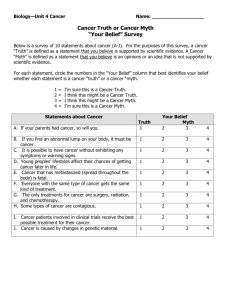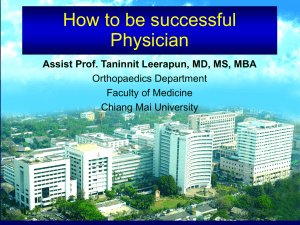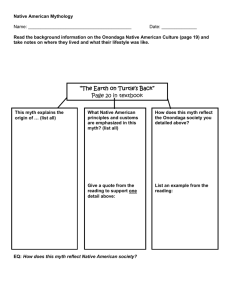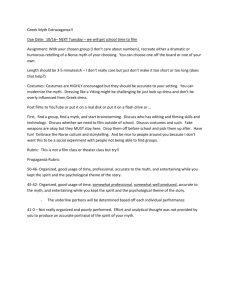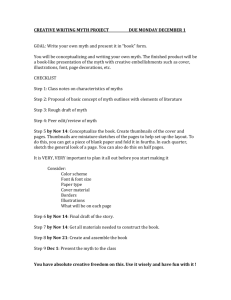March 3, 2013 – Paul got it wrong
advertisement
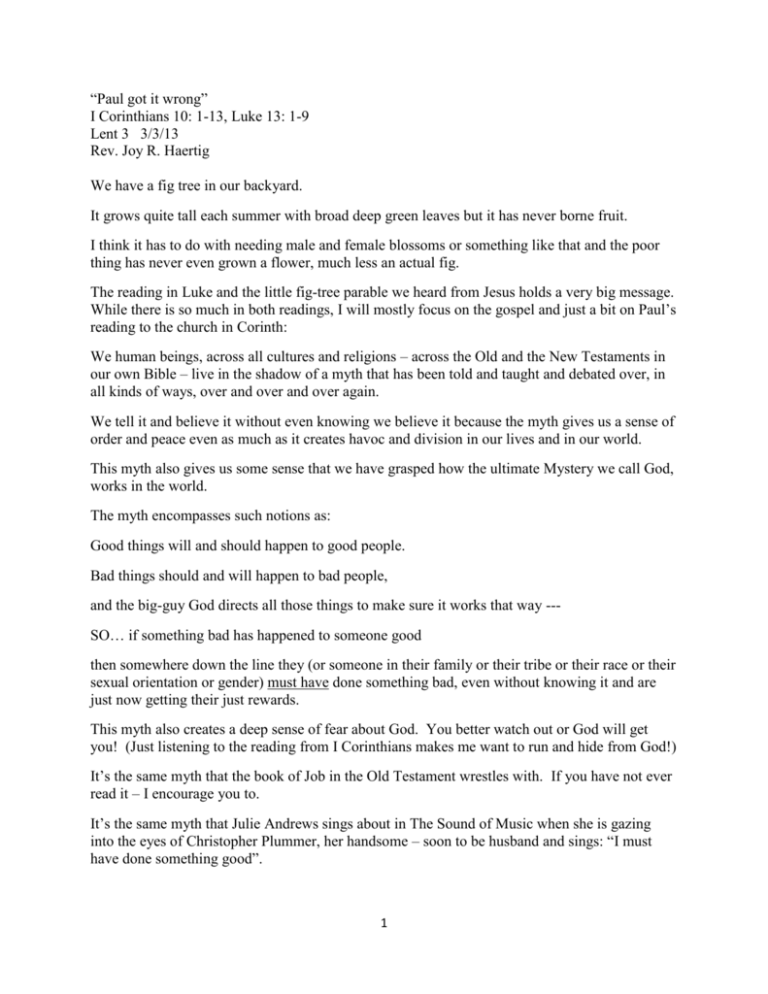
“Paul got it wrong” I Corinthians 10: 1-13, Luke 13: 1-9 Lent 3 3/3/13 Rev. Joy R. Haertig We have a fig tree in our backyard. It grows quite tall each summer with broad deep green leaves but it has never borne fruit. I think it has to do with needing male and female blossoms or something like that and the poor thing has never even grown a flower, much less an actual fig. The reading in Luke and the little fig-tree parable we heard from Jesus holds a very big message. While there is so much in both readings, I will mostly focus on the gospel and just a bit on Paul’s reading to the church in Corinth: We human beings, across all cultures and religions – across the Old and the New Testaments in our own Bible – live in the shadow of a myth that has been told and taught and debated over, in all kinds of ways, over and over and over again. We tell it and believe it without even knowing we believe it because the myth gives us a sense of order and peace even as much as it creates havoc and division in our lives and in our world. This myth also gives us some sense that we have grasped how the ultimate Mystery we call God, works in the world. The myth encompasses such notions as: Good things will and should happen to good people. Bad things should and will happen to bad people, and the big-guy God directs all those things to make sure it works that way --SO… if something bad has happened to someone good then somewhere down the line they (or someone in their family or their tribe or their race or their sexual orientation or gender) must have done something bad, even without knowing it and are just now getting their just rewards. This myth also creates a deep sense of fear about God. You better watch out or God will get you! (Just listening to the reading from I Corinthians makes me want to run and hide from God!) It’s the same myth that the book of Job in the Old Testament wrestles with. If you have not ever read it – I encourage you to. It’s the same myth that Julie Andrews sings about in The Sound of Music when she is gazing into the eyes of Christopher Plummer, her handsome – soon to be husband and sings: “I must have done something good”. 1 Most of us link this myth - this way of judging people and tragedies and seeing God as judge, to the Old Testament and less so to the New. But it is really a very prevalent myth across both testaments – across all humankind regardless of time and place. Jesus’ little-parable’s-big-message is that we need to REPENT from believing and living under the shadow and fear of this myth! This myth projects all kinds of harmful baggage onto the amazing gift, grace, wonder, spontaneity and randomness of life ---and onto the will and ways of God. This myth fools us into thinking we can somehow stop bad things from happening to us if we are just good enough – perfect enough – healthy enough – smart enough – kind enough… This dark myth does not help us bear fruit – it helps us bear FEAR. It does not help us sow LOVE it instills in us the need to sow judgment (towards ourselves and others). It does not help us build bridges between peoples and nations, it helps us divide and conquer, build walls and fight wars. This myth does not draw us TOWARDS God but away from God. When Jesus tells his Galilean brothers to “repent or else perish like the others”, I no longer hear a threat, but a plea. We must repent from seeing God and the world from this perspective – it is not contributing to God’s kingdom being on earth as it is in heaven. On the other hand we heard another scripture this morning ---We heard from Paul in his letter to the church in Corinth this exact myth – this exact way of explaining God and suffering. The people in that newly forming church better watch out for the wrath and punishment of God. Be good, Paul tells us – or watch out. No “make good choices” because you and the world will be better off if you do ---or even --“heh, your ancestors made some royal screw-ups and faced some oppressive political systems and some challenging temptations but with God’s help we made fertilizer out of those mistakes and we found our way through it.” If Jesus and Paul were to meet each other toe to toe, nose to nose, at this moment – I think Jesus would look Paul square in the eye and say, “Paul, you’ve got this wrong”. (I recognize of course that there are many fellow preachers out there that would go toe to toe with me on this perspective too!) As long as we continue to live in the shadow of this myth (this belief system)– religious or other, consciously or unconsciously– that good behavior leads to only good outcomes and bad to bad and that big-guy God is in charge and patting on the head and making rich the good people and punishing the bad with prison or cancer ---AIDS or a tsunami ---then 2 we will continue to deny and miss the thirst-quenching abundance of God’s love and grace that washes over and around and within, in time and beyond time, through good times and bad – heartache and terror – joyful beginnings and painful endings – mistakes and successes. “Repent” from this belief system – this way of living and judging yourself, others and God” ---Jesus tells us,” or we will surely die of thirst.” Jesus’ little fig tree parable tells us a big message: We humans want to cut down that useless little fig tree that does nothing but take up space year after year. We humans think: “I bet that fig tree came from some degenerate seed that would have been better left in the garbage somewhere…hmmm…(we mutter to ourselves) God must not like that fig tree otherwise it would be making fruit to feed its owner.” But just before the fig tree loses everything --- The Gardener ---The Gardener of Second chances, of encouragement, the Gardener of Grace comes along and speaks up on its behalf: “Oh come on, let’s just turn the ground a bit, maybe get it another tree to plant beside it…how about some fertilizer or maybe the sun will shine more this next summer…let’s give it another chance.” God does not threaten our very existence due to the mistakes we make or the fruit we fail to bear or use our failures as public examples to frighten others as Paul so shamelessly proclaims, nor does God promise us a pain free perfect fruit orchard (or rose garden, as my father used to tell me) for being good. It is a little story with a big message, isn’t it? Let us pray. 3



